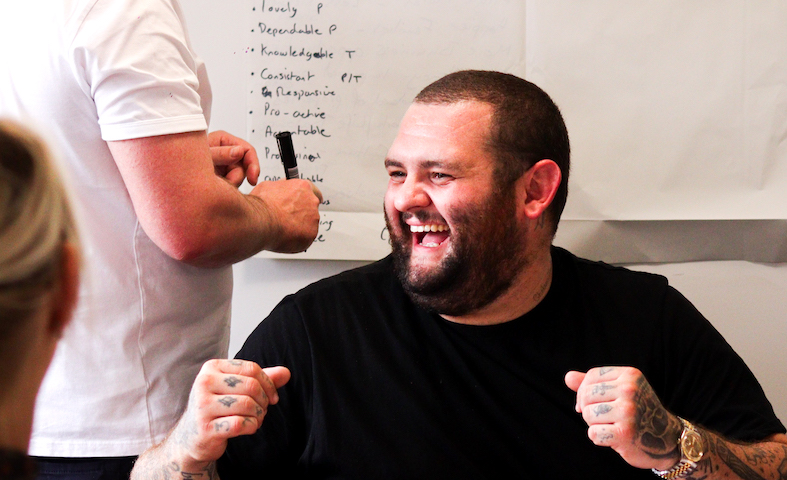A frequent request from either new or existing customers is for MGI to help in equipping people with the skills they need to have confident conversations to effectively manage whatever comes their way at work. Interestingly this can include everyone from the Board room to the frontline customer service teams. Wherever you sit in the organisational structure, there are times when requests, questions, feedback or the need to provide clear direction and messaging can cause us to pause for a moment because we are not completely confident in how to respond.
This might also apply to creating communications to initiate a message that requires careful planning. Creating the communication or responding in the moment may necessitate a higher level of confidence and fortitude to have the courage to say what needs to be said. We are sure that most of us can recall a time when such a situation required us to step up and communicate assertively to achieve the best possible outcome.
In our research, we see many responses to that situation, such as:
- Delay. This could be a sensible strategy for formulating the best communication, or it could be less effective because we are going round the houses or procrastinating because we are either unsure of what to say or do not want to have to say it. Sometimes a delay is required so that facts can be gathered and options considered; in these situations we need to keep in touch with progress reports and let the other person know we are working on the best response.
- Negative communication such as aggression, irritation, anger, criticism and upset because the situation has triggered us into an emotional state and we have not taken the time to reflect and temper our response.
- Avoidance or head in the sand, ignoring the situation maybe hoping that it will go away. Again, uncertainty about what to say or fear of how the other person will react or respond to what we need to say could be at the heart of these situations.
- Approaching the situation professionally and communicating carefully to find a good way forward with honesty, assertiveness and openness.
Four important beliefs
Underpinning confident conversations to achieve the best possible outcome requires a confident mindset which, in our experience, is demonstrated by four important beliefs:
- A belief in taking accountability in our job role; when someone asks us for information, provides feedback, challenges a decision or seeks support or guidance, we need to do our best to take accountability to be helpful in our response.
- A belief that by working together, influencing others, and applying our intellect and creativity we can find solutions, options, and alternatives – that together, one way or another we can find a way forward.
- Respect for others’ viewpoints – the other person is just that, a person with the right to their opinions and positions, and even if we disagree with them, we will listen and respond respectfully.
- A confidence that we are making a difference, that what we do matters and contributes to the success of our organisation. That we do have an important role to play.
To be able to operate with this mindset as much of the time as possible requires us to have a high level of self-awareness and a set of self-management tools prior to communicating with others to avoid any of the suboptimal responses described above. By being self-aware and conscious of whether we are in the best place or state to have a confident conversation, we lay firm foundations for ensuring that conversation has a positive outcome and that we are doing everything we can to that end.
The importance of structuring communication
Finally, we know from our experience working with customers who have to respond to sometimes extremely difficult and demanding situations that we can influence a positive outcome by consciously structuring our communication. A checklist to consider is:
- Start with a people focus to demonstrate understanding of the other person’s situation with appropriate empathy.
- Be ready with options, alternatives and what is possible before stating what is not.
- Be certain of your facts and any technical information that you need to respond professionally.
- Be clear on anything that is not possible if you have to say ‘no’ or deliver disappointing news.
- Be prepared to collaborate with the other person to achieve the best outcomes.
- Be clear on any next steps and responsibility for them.
Giving people the ability to respond positively and constructively in any situation increases their responsibility and ability to take ownership for whatever comes their way at work.
If you would like help to improve your communications with customers please do get in touch about our Customer Service Excellence training.
Read our latest articles
Explore our latest blogs, written on topics to help you and your people thrive at work.

Pathway to thriving and success: building your team’s resilience
As today’s workforce navigates a dynamic environment, the need for skills that enhance wellbeing, resilience and optimism is an important priority. By focusing on their people’s needs, leaders can provide tools to empower their teams with confidence and resilience. This foundation strengthens collaborative efforts, fostering productive and positive workplaces that drive both individual and organisational […]
Discover

Mastering three vital customer service skills in frontline financial services
Working within the financial sector around the world has demonstrated to us at MGI the importance of three key customer service skills for all in the frontline to master. To create positive customer experiences, build trust, and retain customers requires an excellent balance of both people and technical skills and knowledge. Whether it’s handling a […]
Discover

The fundamental people skills needed by managers and leaders
Effective leadership and management are built on a solid foundation of people skills. Wherever an individual sits in an organisation, the ability to communicate respectfully, take ownership, focus on solutions and contribute positively to the organisation is paramount. These essential skills define how managers lead, inspire and collaborate with others and fostering them will lay […]
Discover

Building optimism as part of your customer service ethos
Optimism is a fundamental characteristic that shapes how service givers interact with customers, solve problems and contribute to the overall success of an organisation. Optimism fuels a positive outlook, encourages creativity in problem-solving and builds trust with customers. It empowers service givers to approach challenges as opportunities, ensuring that customers always feel heard, valued and […]
Discover

5 ways to improve customer care in your organisation
Knowing that service-givers in an organisation care about their customers and work diligently to do their best for them is an important factor in delivering service excellence. Therefore, a clear focus on customer care should be at the heart of any organisation. Delivering exceptional service strengthens relationships while boosting customer loyalty and satisfaction. To truly […]
Discover

Empathy in Customer Service: Strategies for handling challenging situations
Empathy is essential in customer service, as it helps build trust and ensures customers feel heard and valued. In our discussions with customers, there is a strong desire and need to help service givers professionally express empathy. Showing empathy is a vital service skill and can turn a negative experience into a positive one. Below […]
Discover

Pathway to thriving and success: building your team’s resilience
As today’s workforce navigates a dynamic environment, the need for skills that enhance wellbeing, resilience and optimism is an important priority. By focusing on their people’s needs, leaders can provide tools to empower their teams with confidence and resilience. This foundation strengthens collaborative efforts, fostering productive and positive workplaces that drive both individual and organisational […]
Discover

Mastering three vital customer service skills in frontline financial services
Working within the financial sector around the world has demonstrated to us at MGI the importance of three key customer service skills for all in the frontline to master. To create positive customer experiences, build trust, and retain customers requires an excellent balance of both people and technical skills and knowledge. Whether it’s handling a […]
Discover

The fundamental people skills needed by managers and leaders
Effective leadership and management are built on a solid foundation of people skills. Wherever an individual sits in an organisation, the ability to communicate respectfully, take ownership, focus on solutions and contribute positively to the organisation is paramount. These essential skills define how managers lead, inspire and collaborate with others and fostering them will lay […]
Discover

Building optimism as part of your customer service ethos
Optimism is a fundamental characteristic that shapes how service givers interact with customers, solve problems and contribute to the overall success of an organisation. Optimism fuels a positive outlook, encourages creativity in problem-solving and builds trust with customers. It empowers service givers to approach challenges as opportunities, ensuring that customers always feel heard, valued and […]
Discover

5 ways to improve customer care in your organisation
Knowing that service-givers in an organisation care about their customers and work diligently to do their best for them is an important factor in delivering service excellence. Therefore, a clear focus on customer care should be at the heart of any organisation. Delivering exceptional service strengthens relationships while boosting customer loyalty and satisfaction. To truly […]
Discover

Empathy in Customer Service: Strategies for handling challenging situations
Empathy is essential in customer service, as it helps build trust and ensures customers feel heard and valued. In our discussions with customers, there is a strong desire and need to help service givers professionally express empathy. Showing empathy is a vital service skill and can turn a negative experience into a positive one. Below […]
Discover
Connect with us
Ready to discover what we can do for you?







